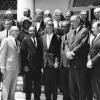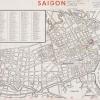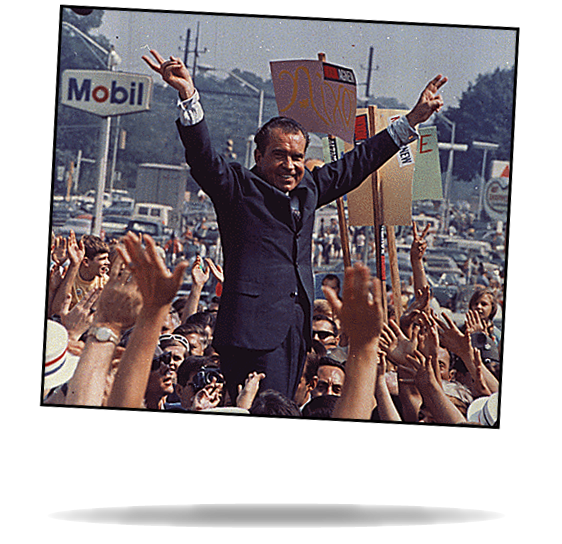
1968: A Year of Turmoil and Change

1968 was a turning point in U.S. history, a year of triumphs and tragedies, social and political upheavals, that forever changed our country. In the air, America reached new heights with NASA’s Apollo 8 orbiting the moon and Boeing’s 747 jumbo jet’s first flight. However, all was not well on the ground: the country lost a Navy intelligence ship (USS Pueblo) and two proponents of peace—Martin Luther King, Jr., and Robert F. Kennedy. Other events that made history that year include the Vietnam War’s Tet Offensive, riots in Washington, DC, the landmark Civil Rights Act of 1968, and heightened social unrest over the Vietnam War, values, and race.
The National Archives holds records documenting the turbulent time during 1968. Explore the records in the National Archives Catalog related to all the triumphs and tragedies, social and political upheavals, that forever changed our country.
Pieces of History Blog: The National Archives and 1968: A Year of Triumph and Tragedy
In reflection, 1968 was a year of triumph and tragedy. International and national events changed the landscape of America and the world around it forever. Now 50 years later, the National Archives holds records of the events that shaped our nation during that critical era.
In January 1968, the fighting in Vietnam was at a stalemate. General Westmoreland, commander of the American forces, announced that the end of the war was in view, but the North Vietnamese had different ideas. In his book Hue 1968, author and journalist Mark Bowden, discusses the Tet Offensive and how the North Vietnamese planned to win the war in a single stroke with military actions and popular uprisings across South Vietnam, but the most crucial part of the plan was the capture of Hue, the country’s cultural capital.
Dr. Erik B. Villard and a panel discuss the Tet Offensive and Villard’s book, Combat Operations: Staying the Course, September 1967–October 1968. The panel will explore the 12-month period when the Viet Cong and their North Vietnamese allies embarked on a new and more aggressive strategy that shook the foundations of South Vietnam and forced the United States to reevaluate its military calculations in Southeast Asia.
In Our Year of War, Lt. Gen. Daniel P. Bolger (ret.) tells the gritty and engaging story of two brothers—Chuck and Tom Hagel—who went to war in Vietnam, fought in the same unit, and saved each other's life. One supported the war, the other detested it, but they fought it together.
Videos
Bobby Kennedy: A Raging Spirit, 11/15/2017 Chris Matthews discusses his book Bobby Kennedy: A Raging Spirit with Martin Nolan, former Boston Globe reporter/editor.
Medal of Honor Presentation by President Johnson (following Tet), 11/19/1968
NASA Film - Debrief: Apollo 8, features photo of the lunar surface, Earth as seen from the Moon, and on-board activities of astronauts Frank Borman, Jim Lovell, and Bill Anders.
The Pueblo Incident: Analysis of the North Korean Evidence, U.S. Navy video
Blue House Raid, exhibit from the Korean Military Armistice Commission Meetings Held to Resolve the USS Pueblo Crisis
Audio
The Pueblo: Armed Spy Ship of the U.S. Imperialist Aggression Forces, North Korean Army propaganda film shows captured crew from the USS Pueblo
Moving images related to the USS Pueblo and Crew, 1967–1971
Sound recordings related to the USS Pueblo and Crew, 1967–1971
NARAtions: Taking the Streets in Chicago: 1968 Democratic National Convention on Historypin
National Declassification Center: USS Pueblo Ship Plans
Pieces of History: The National Archives and 1968: A Year of Triumph and Tragedy
Pieces of History: LBJ and MLK
Pieces of History: Vietnam: The First Televised War
Pieces of History: One Giant Leap: The Apollo Space Program at 50
Pieces of History: Reflections on LBJ and Civil Rights by LBJ Library Foundation head Mark Updegrove
Washington, DC
“Remembering Vietnam,” the National Archives’ first-ever Vietnam War exhibition, features a section on the Tet Offensive. Through January 9, 2019.
Presidential Libraries
Johnson Library: The 1968 Olympics: A Modern Design for the Ancient Games, June 23–November 28, 2018.
Traveling or Online Exhibits
Traveling:
Online
Crew of Apollo 8—A View from Lunar Orbit, 1968, featured in “Eyewitness: American Originals from the National Archives.” Includes hi-res links to images, documents and audio.
Educational Resources
CIA Analysis of the Tet Offensive, 2/12/1968
Vietnam-related primary sources and teaching activities on DocsTeach
Johnson Library Tet Offensive Presidential Committee: Lesson Plan & Documents
National Archives at NYC online MLK educational activities
Washington, DC
Special Christmas Eve Message from Apollo 8, see related press release
Black Power: National Archives Subject Guide
President’s Commision on the Assassination of Robert Kennedy, finding aid to records
President Johnson’s proclamation designating 4/7/68, as a national day of mourning for MLK, Jr.
Cable from Commander in Chief, Pacific Fleet, to Chair of the Joint Chiefs of Staff re: Tet, 1/31/1968. Update from Admiral Sharp to General Westmoreland on the situation in Saigon, including attack on the U.S. Embassy.
U.S. Army Psychological Operations Report on Tet Campaign and Offensive, 10/31/1968
President Johnson’s Daily Brief, 10/5/1968Excerpt: “There is a general feeling of insecurity in Mexico City following the extreme violence of 2 October. The capital is rife with rumors of revolution and military takeover, and the government expects a major act of sabotage before the opening of the Olympics on 12 October.”
President Johnson’s Daily Brief, 10/8/1968Excerpt: “A temporary truce may follow last
night's decision by student leaders to suspend mass rallies. If observed, this ban will smooth things out for the Olympics, but the students by no means have given up, and any armistice will be uneasy at best. The government has not abandoned its charges that leftists are responsible for the disorders.”
Transcripts of audiotapes of the Apollo 8 telecast, December 24, 1968
Findings on Martin Luther King, Jr., Assassination, House Select Committee on Assassinations
Proclamation 3839, designating April 7, 1968, as a day of national mourning for MLK
Other:
The Enduring Chronicle: Civil Rights Documents at the National Archives at Atlanta
Presidential Libraries
The USS Pueblo Incident, Chapter 5, Presidential Libraries Holdings Relating to Prisoners of War and Missing in Action, From National Archives Reference Paper 104
Kennedy Library
RFK’s Statement on MLK Assassination, April 4, 1968
Audio of RFK’s Statement on MLK Assassination, April 4, 1968
Johnson Library
Vietnam and the Presidency, Media and the role of public opinion,3/11/2006, includes discussion of the Tet Offensive with David Halberstam, Frances Fitzgerald, Brian Williams, Dan Rather, and Steve Bell
Viet Reflections on Tet, 2/5/1968, from President’s Daily Report on North Vietnam: A North Vietnamese analysis of U.S. political attitudes on the Vietnam War following the Tet Offensive. General Westmoreland is called “boastful” and Johnson is confused “as the man in the moon.”
Mention of Tet in Johnson’s Address to the Nation Announcing Steps To Limit the War in Vietnam and Reporting His Decision Not To Seek Reelection, 3/31/1968
CIA Releases Previously Classified Presidential Briefings at LBJ Presidential Library (including discussion of Tet) 9/16/2015
Phone excerpt: President Lyndon Johnson talks about the turbulent events in the first four months of 1968, including Tet and the Pueblo incident
A Conversation between LBJ and MLK
President Johnson’s Daily Diary Entry from April 4, 1968, about the MLK assassination
Nixon Library
Memo for the President from Henry Kissinger, Analysis for Vietnam. Excerpt: “The shock of the Tet Offensive was in part attributable to our failure to analyze available intelligence accurately.”
Finding Aid to 1968 Campaign Records Collection
Reagan Library
Remarks on signing the bill making MLK’s birthday a national holiday, 11/2/1983
Proclamation 5431, creating Martin Luther King, Jr., Day, January 18, 1986
Ford Library
Address by President Ford to the "Tell It Like It Is" Symposium, 3/1/1968,includes discussion of Tet.
Press release from Congressman Ford about the Pueblo Incident, 2/5/1968





The crew of Apollo 8 was armed with still and movie cameras to photograph the Moon; but the most enduring image of their mission is this photograph of their own home, planet Earth. National Archives, Records of the U.S. Information Agency [306-PSD-68-4049c
Martin Luther King, Jr., and civil rights leaders with Attorney General Robert F. Kennedy and Vice President Lyndon B. Johnson. Photograph by Abbie Rowe, National Park Service, in the John F. Kennedy Presidential Library and Museum, Boston.
President Johnson and staff watch TV news about the assassination of Martn Luther King, Jr. LBJ Library photo by Mike Geissinger.
Map of Saigon defense of the U.S. Embassy. Department of Defense. Department of the Army. U.S. Army Pacific. U.S. Army Vietnam. 101st Airborne Division (Airmobile).

